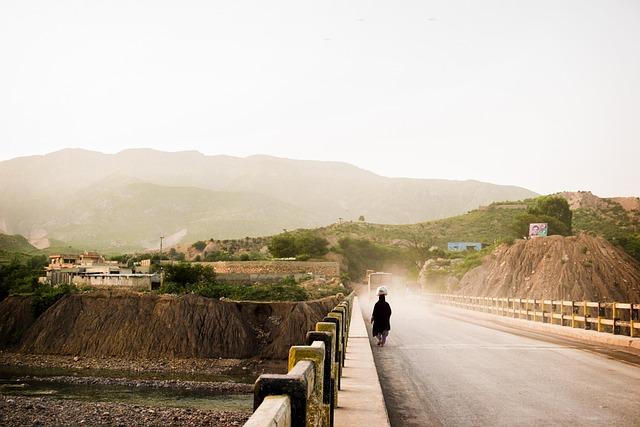In a world increasingly characterized by the rapid flow of information, the delicate yet vital role of journalism emerges as both a beacon of truth and a battleground of narratives. In Pakistan, a nation steeped in a rich tapestry of history, culture, and complexity, the pursuit of truth is fraught with challenges that test the mettle of journalistic integrity. From the bustling streets of Karachi to the political corridors of Islamabad, journalists navigate a landscape marred by censorship, political unrest, and societal pressures that often blur the lines between fact and fiction. As the stakes rise and the demand for accountability intensifies, understanding the intricacies of journalism in Pakistan becomes not only essential but imperative. This article delves into the multifaceted challenges faced by journalists in their quest for truth, exploring the intersection of freedom, responsibility, and the relentless pursuit of an informed society.
Exploring the Landscape of Media Freedom in Pakistan
In this complex ecosystem, the interplay of political power and media freedom raises critical questions about the role of journalism in society. The impact of social media has also transformed this landscape, providing both opportunities and risks for aspiring reporters. While platforms like Twitter and Facebook offer a voice to the voiceless, they can also become tools for misinformation and divisiveness. To illustrate the current state of media freedom in Pakistan, consider the following key statistics:
| Aspect | Current Status |
|---|---|
| Number of media outlets | Over 1,500 |
| Freedom Index Rank | 157th out of 180 |
| Reported attacks on journalists (2022) | 50+ incidents |
| Independent news websites | 300+ |

Balancing Act: Ethical Dilemmas Facing Journalists
In an environment where the line between fact and opinion often blurs, journalists in Pakistan frequently grapple with ethical dilemmas that challenge their commitment to truth. The quest for integrity may collide with the pressures of political influence, corporate interests, and censorship, marring the landscape of unbiased reporting. Journalists are placed in an uncomfortable position, torn between the imperative of disseminating accurate information and the potential repercussions of exposing sensitive truths. The role of a journalist shifts from being a mere observer of events to a beleaguered defender of ethical standards, often risking personal safety and professional credibility in the process.
Furthermore, the prevalence of misinformation has intensified the ethical responsibilities of the press. With the rise of social media, sensationalism can easily eclipse sharp, factual journalism, leaving reporters to navigate this treacherous terrain. In this context, ethical considerations emerge, such as:
- Accuracy vs. Speed: the race to report breaking news can compromise thorough fact-checking.
- Privacy vs. Public Interest: determining what constitutes the public’s right to know while respecting individual privacy.
- Subjectivity vs. Objectivity: balancing personal beliefs with impartial reporting.
To illustrate the profound impact of these dilemmas, a simple overview of the journalist’s decision-making landscape can be encapsulated in the table below:
| Ethical Dilemma | Pitfall | Potential Solution |
|---|---|---|
| Accuracy vs. Speed | Misleading the public | Implement strict editorial guidelines |
| Privacy vs. Public Interest | Invasion of personal boundaries | Establish clear ethical standards |
| Subjectivity vs. Objectivity | Loss of credibility | Continuous ethics training |

Resilience and Innovation: Overcoming Censorship in Reporting
The struggle against censorship has fueled a remarkable spirit of resilience among journalists in Pakistan. Despite facing threats, intimidation, and the looming presence of state control, many reporters have found innovative ways to circumvent restrictions and bring untold stories to light. This can be seen through:
- Digital Platforms: Utilization of social media and encrypted messaging apps to share information rapidly.
- Citizen Journalism: Empowering ordinary citizens to report news, thus widening the scope of information dissemination.
- International Collaboration: Partnering with foreign media outlets that support independent journalism.
Moreover, the evolution of new technologies plays a crucial role in enhancing journalistic integrity. Tools for secure communication and data protection allow journalists to work with greater autonomy and confidence. These technologies enable:
| Technology | Benefit |
|---|---|
| VPN Services | Bypass geographical restrictions on content. |
| Encryption Software | Secure communication with sources. |
| Anonymous Reporting Tools | Encourage whistleblowers to share critical information without fear. |
Through such innovative approaches, journalists continue to challenge the boundaries of censorship, ensuring that the voices of the people remain heard in an ever-evolving landscape of media and information.

Building Trust: Strategies for Fostering Credible Journalism
In an environment where misinformation can easily spread, establishing credibility is paramount for journalists. Transparent reporting practices not only enhance trust but also empower audiences to make informed decisions. Journalists can achieve this by actively engaging with their audience, addressing their concerns, and being open about the sources of their information. This can include:
- Disclosing sources: Clearly indicating where information is obtained can alleviate skepticism.
- Utilizing fact-checking tools: Incorporating reliable fact-checking methodologies promotes accuracy.
- Encouraging feedback: Inviting readers to provide input creates a dialogue, enhancing community trust.
Furthermore, collaboration within the media landscape serves as a powerful tool in building trust. By partnering with reputable organizations and leveraging cross-checking of facts, journalists can bolster their credibility. Establishing a network where journalists can share insights and strategies—particularly in a complex socio-political landscape—reinforces integrity. Consider the following strategies for cultivating a trustworthy journalism ecosystem:
| Strategy | Description |
|---|---|
| Peer Reviews | Encouraging fellow journalists to review articles before publication. |
| Workshops | Hosting training sessions on ethical reporting standards. |
| Community Engagement | Interacting with local communities to understand their information needs. |
Closing Remarks
As we reach the end of our exploration into the intricate landscape of journalism in Pakistan, it becomes clear that navigating the path to truth is fraught with complexity. Journalists in this vibrant yet turbulent environment operate under the weight of expectations, pressures, and, at times, perilous consequences. Their endeavor to provide clarity in a world often shrouded in misinformation is a testament to their resilience and commitment to the public.
In a society where the landscape is constantly shifting, the role of the journalist is more crucial than ever. The struggle for truth is not merely a professional duty, but a foundational pillar of democracy, accountability, and societal progress. It requires an unwavering dedication to ethical standards amidst the challenges posed by political and social turbulence.
As we reflect on the nuanced realities faced by those who brave the currents of Pakistan’s media, we are reminded that journalism is not just about reporting facts; it is about storytelling that shapes understanding and fosters dialogue. The journey ahead is undoubtedly challenging, but with perseverance and adaptability, the potential for a more informed, aware, and resilient society is within reach. May we continue to support and advocate for a vibrant press that dares to seek the truth, even in the face of adversity.



